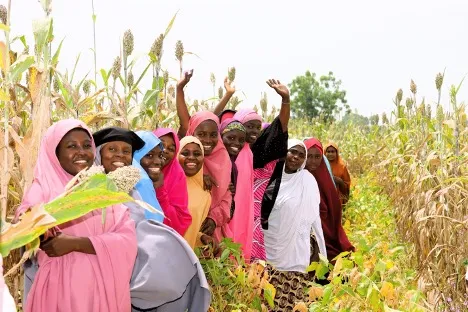IWD Special: Women Leading the Charge for Equality in Agriculture and Growth
In central Malawi, Alefa Ofesa and Lloyd Phale’s lives underwent a transformation two years ago when Alefa joined a project aimed at supporting and training farmers to adapt to unpredictable rainfall. Through the TRADE project (Transforming Agriculture through Diversification and Entrepreneurship Programme), Alefa, a 42-year-old mother, acquired new skills such as planting seeds in parallel rows with rain collection channels, constructing terraces, practicing contour ploughing, and building check dams to manage water flow and prevent soil erosion.
Having farmed for over two decades, Alefa and Lloyd found the TRADE project instrumental in enhancing their agricultural practices. Alefa emphasized how the project encouraged women’s active involvement in agriculture, providing them with the knowledge and confidence needed to improve productivity.
The TRADE project, a collaboration between the Malawian government and the International Fund for Agricultural Development (IFAD), focuses on empowering rural women to address gender inequality. IFAD’s Vice President, Geraldine Mukesima, stresses on International Women’s Day that investing in gender equality is not only urgent but also a smart move for economic growth, food security, income opportunities, and improved lives, particularly in rural areas.
Gender inequality often leads to productivity gaps, not due to women’s inefficiency but because of unequal access to land and agricultural resources, as highlighted in a 2019 IFAD report.
Despite the progress, achieving gender equality by 2030 faces challenges, notably a lack of financing, with an annual deficit of $360 billion for gender-equality measures. Alefa, after her training, has become a beacon of knowledge, sharing her skills with other women in her community, leading to the formation of supportive farming networks.
The training also transformed Alefa’s partnership with her husband, fostering equal decision-making and boosting productivity. Amos Mailosi, the regional environment and climate change officer for the TRADE Programme, emphasizes the program’s focus on gender and social inclusion, empowering both women and men to participate equally in decision-making at the household level.
Alefa and Lloyd’s joint efforts have not only secured enough food for their family but have also increased their income through selling surplus harvest. Alefa plans to invest the additional earnings in her children’s education and acquire an ox cart for transportation, showcasing the broader impact of empowering women in agriculture.
The gender gap in agricultural productivity in eastern Africa stems from factors like limited access to male family labor, women’s restricted use of agricultural machinery, and their limited participation in high-value crop enterprises. The TRADE program aims to address these challenges and create a more equitable and sustainable farming landscape.













